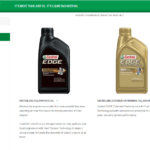Regular and synthetic oils are both used to lubricate engine parts, protecting the moving parts of the engine and preventing wear and tear.
However, there is a common myth that once you switch to synthetic oil, you can never go back to using regular oil. This is not entirely true, but there are some things to consider before making the switch back.
One reason why some people believe that you cannot switch back to regular oil after using synthetic oil is that synthetic oils are less prone to breaking down due to oxidation, ensuring that they last longer than conventional oils.
This means fewer oil changes, which can save you time and money in the long run. Synthetic oils also have a better ability to clean the engine and keep it free of deposits, sludge, and other contaminants.
However, switching back to regular oil may mean more frequent oil changes, as conventional oils tend to break down more quickly and require more frequent replacements.
It is important to note that some vehicle manufacturers recommend or even insist on using synthetic oil in their engines. Therefore, switching back to regular oil may not be recommended or may even void your warranty.
However, if your vehicle manufacturer does not have any specific requirements, it is possible to switch back to regular oil after using synthetic oil.
The Benefits of Synthetic Oil

As per Pennzoil (.com), synthetic oil is a type of motor oil that is chemically engineered to provide superior performance and protection for modern engines.
It is made up of a combination of base oils and additives that are designed to provide better lubrication, wear protection, and resistance to high temperatures. Here are some of the benefits of synthetic oil:
Performance in Extreme Temperatures
One of the main benefits of synthetic oil is its ability to perform well in extreme temperatures. Synthetic oil is formulated to remain stable and resist breaking down in high temperatures, which can cause conventional oils to break down and lose their viscosity.
This stability also allows synthetic oil to flow more easily in cold temperatures, which can improve engine start-up and reduce wear on engine parts.
Engine Protection and Performance
Synthetic oil provides superior engine protection and performance compared to conventional oils. It has a higher lubricity, which means it can reduce friction and wear on engine parts.
This can lead to longer engine life and better fuel economy. Synthetic oil also has a better ability to clean the engine and keep it free of deposits, sludge, and other contaminants.
Longevity and Lifespan
Synthetic oil has a longer lifespan than conventional oils, which can save you time and money in the long run. It is less prone to breaking down due to oxidation, ensuring that it lasts longer than conventional oils.
This means fewer oil changes, which can save you time and money. Synthetic oils also have a better ability to resist viscosity breakdown, which can lead to longer engine life.
Overall, synthetic oil provides many benefits for modern engines, including improved performance, engine protection, and longevity.
It is available in full synthetic and synthetic blend formulations, and many manufacturers recommend its use for high mileage engines or those under warranty. Synthetic oil can also provide wear protection for turbochargers and improve fuel efficiency.
Cost Considerations

Expense of Synthetic Oil
One of the primary reasons why people switch from synthetic oil to conventional oil is the cost. Synthetic oil is more expensive than regular oil. A gallon of synthetic oil can cost up to three times more than a gallon of conventional oil.
However, as per Car and Driver (.com), synthetic oil lasts longer than conventional oil, which means that you don’t have to change it as often. This can help offset the higher cost of synthetic oil.
Maintenance and Fuel Consumption
Using synthetic oil can also help reduce maintenance costs and improve fuel consumption. Synthetic oil is designed to provide better engine protection, which can help reduce wear and tear on your engine.
This can help reduce maintenance costs over time. Additionally, synthetic oil has a higher viscosity index, which means that it can retain its viscosity even when exposed to extreme temperatures.
This can help improve fuel consumption by reducing engine friction and improving overall engine efficiency.
However, it’s important to note that switching from synthetic oil to conventional oil may result in increased maintenance costs and reduced fuel efficiency.
Conventional oil is not designed to provide the same level of engine protection as synthetic oil, which means that your engine may experience more wear and tear over time.
This can lead to increased maintenance costs. Additionally, conventional oil may not provide the same level of fuel efficiency as synthetic oil, which means that you may end up spending more money on gas over time.
Overall, while synthetic oil may be more expensive upfront, it can help reduce maintenance costs and improve fuel consumption over time.
However, if cost is a major concern, using conventional oil may be a more affordable option. It’s important to weigh the pros and cons of each type of oil and choose the option that best fits your needs and budget.
Common Misconceptions and Myths
About Switching Back to Regular Oil
There is a common myth that once you switch to synthetic oil, you can never go back to regular oil. However, this is not true.
You can switch back to regular oil after using synthetic oil without any issues. In fact, synthetic oil will mix directly with regular oil of the same weight, so there is no need for an engine flush.
It is important to note that switching back to regular oil after synthetic oil may result in a slight decrease in engine performance and fuel economy.
This is because synthetic oil is a superior lubricant and provides better engine protection than regular oil. However, this decrease in performance is negligible and should not cause any significant issues.
Another misconception is that switching back to regular oil after using synthetic oil will cause engine damage. This is also not true. As long as you use the correct weight and grade of oil recommended by the manufacturer, there should be no issues when switching back to regular oil.
About Synthetic Oil’s Harmfulness
There is a common misconception that synthetic oil is harmful to engines. This is not true. Synthetic oil is actually a superior lubricant and provides better engine protection than regular oil.
It has a higher viscosity index, which means it can retain its viscosity even when exposed to extreme temperatures. This helps to reduce engine wear and tear and prolong engine life.
Another misconception is that synthetic oil causes leaks. This is also not true. In fact, synthetic oil can actually help to reduce leaks and oil consumption. This is because synthetic oil has a higher resistance to evaporation and can maintain its viscosity for longer periods of time.
It is important to note that while synthetic oil is a superior lubricant, it is also more expensive than regular oil. However, the benefits of using synthetic oil outweigh the cost. It provides better engine protection, reduces engine wear and tear, and prolongs engine life.
In summary, it is a common myth that you cannot switch back to regular oil after using synthetic oil. This is not true, and switching back to regular oil should not cause any significant issues.
Additionally, synthetic oil is not harmful to engines and provides better engine protection than regular oil.
The Impact of Oil Change on Engine

When it comes to changing car oil, it’s important to use the right type of oil for your vehicle. While it may be tempting to switch back to regular oil after using synthetic oil, doing so can have negative consequences for your engine.
Impurities and Sludge Buildup
One of the key differences between synthetic oil and petroleum-based regular oil is the level of impurities. Synthetic oil is designed to have fewer impurities and deposits, which can lead to a cleaner engine and reduced sludge buildup.
However, switching back to regular oil can reintroduce these impurities and lead to sludge buildup over time. This can cause reduced performance and even engine damage if left untreated.
Wear and Tear on Engine Components
Another factor to consider is the wear and tear on engine components. Synthetic oil is designed to provide better protection and reduce engine wear and tear due to its superior viscosity stability and reduced impurities.
However, switching back to regular oil can lead to increased engine wear and tear over time. This can cause engine components to break down more quickly and lead to costly repairs.
In summary, changing the oil in your car is an important part of regular maintenance. While it may be tempting to switch back to regular oil after using synthetic oil, doing so can have negative consequences for your engine.
As a mechanic, I recommend sticking with synthetic oil for its reduced impurities, prevention of sludge buildup, and superior wear and tear protection.
However, if you’re unsure about which grade of oil to use or if an engine flush is necessary, don’t hesitate to consult with a trusted mechanic or refer to your vehicle’s owner’s manual for guidance.
In Closing
Switching back to regular oil after using synthetic oil is not recommended. While it may seem like a cost-effective solution, it can lead to potential engine damage and reduced performance.
Synthetic oil is designed to last much longer than regular oil and has different properties that make it incompatible with engines that require regular oil. Using regular oil after synthetic can cause engine deposits, reduced fuel efficiency, and increased wear and tear on engine components.
Additionally, synthetic oil provides superior engine protection and overall performance compared to regular oil. It offers better oxidation resistance, low volatilities, and cold cranking properties.
These properties help to keep the engine running smoothly and efficiently, reducing the risk of breakdowns and costly repairs.
In conclusion, it is best to stick with synthetic oil for the best engine protection and overall performance. While it may seem like a small cost-saving measure, switching back to regular oil after using synthetic oil can cause more harm than good in the long run.




![How Do I Find Out What Options My Car Was Ordered With? [Using VIN] how do i find out what options my car was ordered with](https://roadsumo.com/wp-content/uploads/2021/06/how-do-i-find-out-what-options-my-car-was-ordered-with-150x150.jpg)




